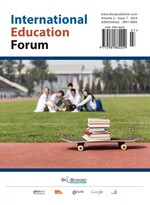Abstract
This paper delves into the pivotal role of generative artificial intelligence (AI) within vocational aesthetic education, specifically focusing on its capacity to augment artistic expression and cultivate technical proficiency. As AI undergoes continuous evolution, it catalyzes significant transformations in educational paradigms by amalgamating creativity with digital acumen, thereby equipping the workforce with adeptness in navigating technologically driven landscapes. The study critically examines how AI reconfigures educational frameworks, enriching learning experiences through tailored, collaborative, and globally oriented approaches. Additionally, it scrutinizes the ethical, pragmatic, and pedagogical hurdles intrinsic to AI integration, encompassing concerns such as data privacy, bias mitigation, and the imperative for perpetual curriculum innovation and educator empowerment. The findings underscore that the realization of AI’s potential in advancing vocational aesthetic education hinges upon strategic deployment, ongoing evaluation, and inclusive discourse among all educational stakeholders, ensuring alignment with educational objectives and responsiveness to global labor market exigencies. This analysis underscores AI’s capacity to optimize educational outcomes and equip students for a multifaceted and evolving future, advocating for proactive and inclusive strategies to harness AI’s advantages within educational milieus.
References
Epstein Z, Hertzmann A, et al., 2023, Art and the Science of Generative AI. Science, 380(6650): 1110–1111.
Yang J, Zhang H, 2024, Development And Challenges of Generative Artificial Intelligence in Education and Art. Highlights in Science, Engineering and Technology, 85: 1334–1347.
Zhou E, Lee D, 2024, Generative Artificial Intelligence, Human Creativity, and Art. PNAS Nexus, 3(3): 052.
Resnick M, 2024, Generative AI and Creative Learning: Concerns, Opportunities, and Choices. MIT Exploration of Generative AI. https://doi.org/10.21428/e4baedd9.cf3e35e5
Spöttl G, Windelband L, 2021, The 4th Industrial Revolution—Its Impact on Vocational Skills. Journal of Education and Work, 34(1): 29–52.
Ma J, 2019, The Challenge and Development of Vocational Education Under the Background of Artificial Intelligence. 2019 5th International Conference on Humanities and Social Science Research (ICHSSR 2019), 2019: 522–525.
Holmes W, Tuomi I, 2022, State of the Art and Practice in AI in Education. European Journal of Education, 57(4): 542–570.
Chung JJY, 2022, Artistic User Expressions in AI-Powered Creativity Support Tools. Adjunct Proceedings of the 35th Annual ACM Symposium on User Interface Software and Technology, 2022: 1–4.
Avdeeff M, 2019, Artificial intelligence and Popular Music: SKYGGE, Flow Machines, and the Audio Uncanny Valley. Arts, 2019: 130.
Deruty E, Grachten M, Lattner S, et al., 2022, On the Development and Practice of AI Technology for Contemporary Popular Music Production. Transactions of the International Society for Music Information Retrieval, 5(1): 35–50.
Miller AI, 2019, The Artist in the Machine: The World of AI-Powered Creativit. The MIT Press, Massachusetts.
Chen L, Chen P, Lin Z, 2020, Artificial Intelligence in Education: A Review. IEEE Access, 8: 75264–75278.
Ragot M, Martin N, Cojean S, 2020, AI-Generated Vs. Human Artworks: A Perception Bias Towards Artificial Intelligence? Extended Abstracts of the 2020 CHI Conference on Human Factors in Computing Systems, 2020: 1–10.
Utz V, Dipaola S, 2021, Exploring the Application of AI-Generated Artworks for the Study of Aesthetic Processing. 2021 IEEE 4th International Conference on Multimedia Information Processing and Retrieval (MIPR), 2021: 393–398.
Muzyka O, Lopatiuk Y, Belinska T, et al., 2021, Modern Aesthetic Education and its Further Directions. Linguistics and Culture Review, 5(S4): 12–21.
Zhang W, Shankar A, Antonidoss A, 2022, Modern Art Education and Teaching Based on Artificial Intelligence. Journal of Interconnection Networks, 22(Supp01): 2141005.
Leonard N, 2020, Entanglement Art Education: Factoring Artificial Intelligence and Nonhumans Into Future Art Curricula. Art Education, 73(4): 22–28.
How ML, Hung WLD, 2019, Educing AI-Thinking in Science, Technology, Engineering, Arts, and Mathematics (STEAM) Education. Education Sciences, 9(3): 184.
Fan X, Zhong X, 2022, Artificial Intelligence-Based Creative Thinking Skill Analysis Model Using Human-Computer Interaction in Art Design Teaching. Computers and Electrical Engineering, 100: 107957.
Li Y, Sun R, 2023, Innovations of Music and Aesthetic Education Courses Using Intelligent Technologies. Education and Information Technologies, 2023, 28(10): 13665–13688.
Aris S, Aeini B, Nosrati S, 2023, A Digital Aesthetics? Artificial Intelligence and the Future of the Art. Journal of Cyberspace Studies, 7(2): 219–236.
Tang T, Li P, Tang Q, 2022, New Strategies and Practices of Design Education Under the Background of Artificial Intelligence Technology: Online Animation Design Studio. Frontiers in Psychology, 13: 767295.
Cetinic E, She J, 2022, Understanding and Creating Art With AI: Review and Outlook. ACM Transactions on Multimedia Computing, Communications, and Applications (TOMM), 18(2): 1–22.
